by Pinchas Cohen
- Commodities post longest winning streak in a decade
- Emerging market currencies strengthen
- Bitcoin rises for a third day; traders hope bottom is in
- investor anxiety climbs over debt ceiling
Key Events
Yesterday, after a Taiwanese newspaper reported that Apple (NASDAQ:AAPL) may cut iPhone X sales targets amid weak sales, the stock sold off on speculation that iPhone sales will disappoint estimates.
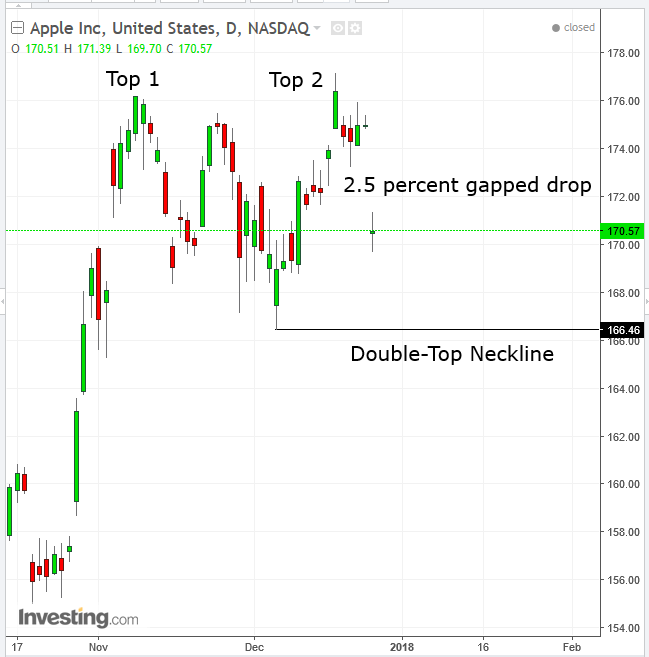
The megacap's selloff led the Technology sector lower. Since trading volumes are light during the holiday week, it's possible for a few key players to easily move prices, which means it’s hard to determine if this will have a lasting effect.
In the very short term, however, the drop weighed on the NASDAQ Composite, which fell the most in a week; the S&P 500 edged lower as well, down 0.11 percent, led by a 0.67 percent slide for the Technology sector, followed closely by defensive sector Utilities, which dropped by 0.59 percent. Thanks to an oil market rally, Energy outperformed, with a 0.88 percent jump.
Global Financial Affairs
A pipeline blast in Libya spurred investors to buy oil contracts.
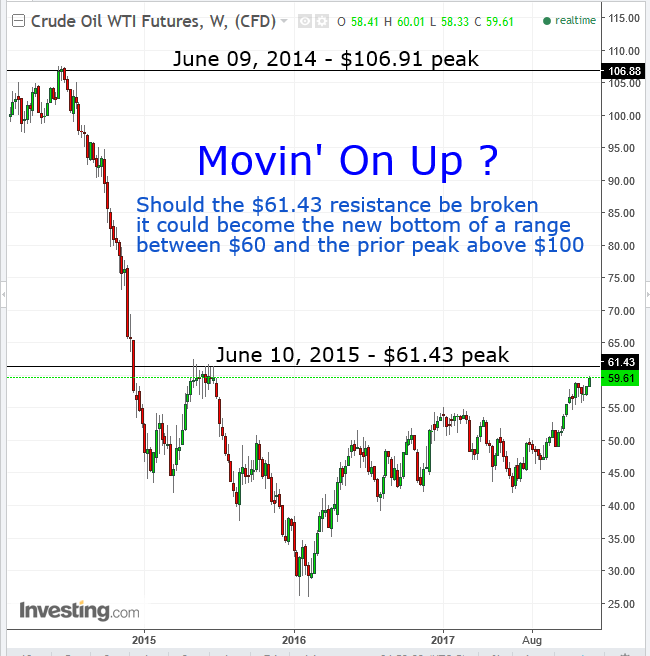
The price transcended its November 24 peak of $59.05, closing at $59.82, with gains unable to remain above $60, as the psychological round number attracted supply. This was the highest close for the commodity since June 24, 2015 when the closing price was $60.2, just $1.16, or 1.9 percent below the June 10, 2015 peak of $61.43. The previous peak, reached before the oil crash of 2014, on June 9, 2014, saw a closing price of $106.91.
The oil surge helped commodities post their longest winning streak in more than a decade, buoying emerging market currencies, which export these commodities, forcing importers to buy more of the exporters’ currencies to pay for their products.
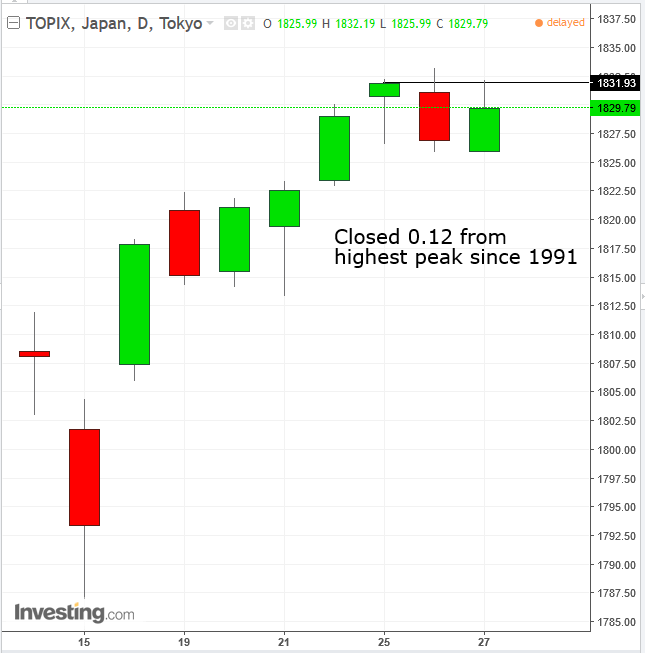
This morning, Asian equities provided mixed results on thin trading. Japan’s TOPIX edged back toward the Monday peak, the index's highest point since 1991. China’s Shanghai Composite fell a full percentage point, while Chinese shares on Hong Kong’s Hang Seng Index remained flat, along with Australian shares, as investors returned from a four day holiday weekend. South Korea’s KOSPI rose 0.3 percent, even as Hyundai Heavy Industries (KS:009540), the world’s second-largest shipbuilder, announced a stock sale, diluting available shares. Its price plunged 34.37 percent.
Nevertheless, the most meaningful market action this morning, as far as US traders might be concerned, was in Taiwan, the source of yesterday's Apple selloff. Taiwan shares rallied as did the technology sector, suggesting easing concerns about analyst downgrades of iPhone X sales estimates. As well, some US analysts dispute the reports, maintaining their buy ratings on the stock.
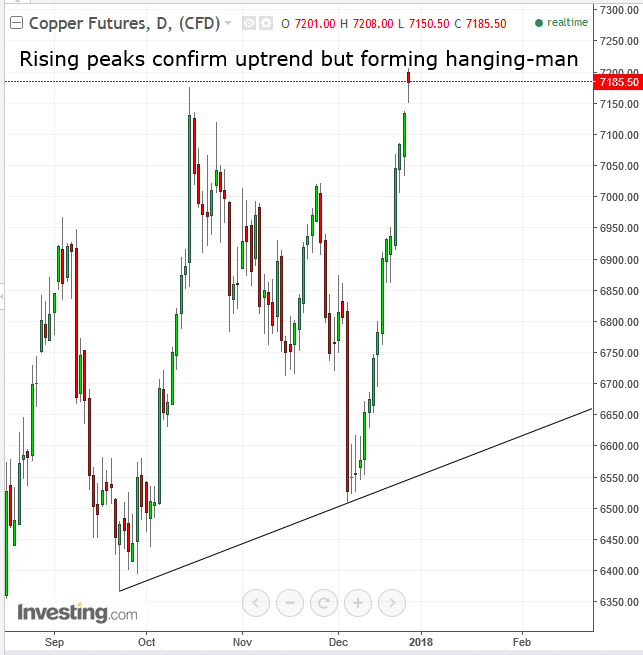
Mining companies led this morning's Stoxx Europe 600 advance, as copper climbed to a three-year high after China ordered its top producer, Jiangxi Copper (OTC:JIXAY), to halt production for at least a week, in order to combat pollution.
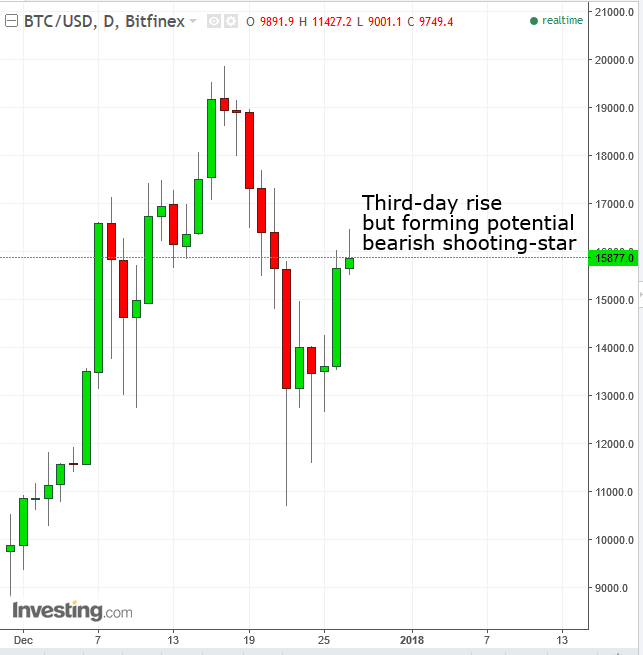
Bitcoin traders are hopeful the cryptocurrency might be forming a bottom above the psychological round $15,000 level, as it's rising for a third consecutive day. If the gains continue it could mean the week-long drop since December 18 from its record, just under the next psychological level of $20,000, is a healthy correction rather than a trend reversal.
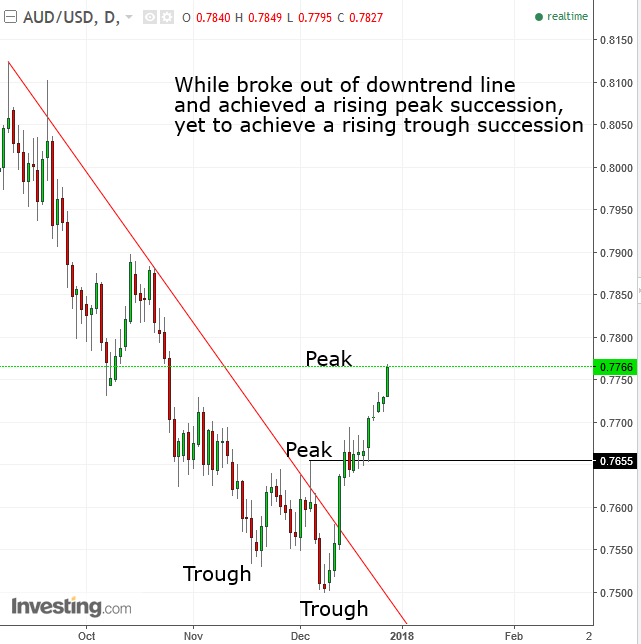
The Aussie jumped 0.45 percent higher versus the USD this morning on a report by the Centre for Economics and Business Research in London, forecasting Australia will rise two notches to 11th place by 2026 on its world economic league table, which would mean an improvement in the country’s economic growth. In addition, the popular cryptocurrency wallet CoinSpot stopped accepting AUD deposits, at least temporarily, citing that banks down under are “unwilling to work” with them. This limits the sale of the Australian dollar, reducing its supply, which could potentially be a reason for the currency's outperformance today. Our analysis and trading strategies for an AUD long position from last week remains relevant.
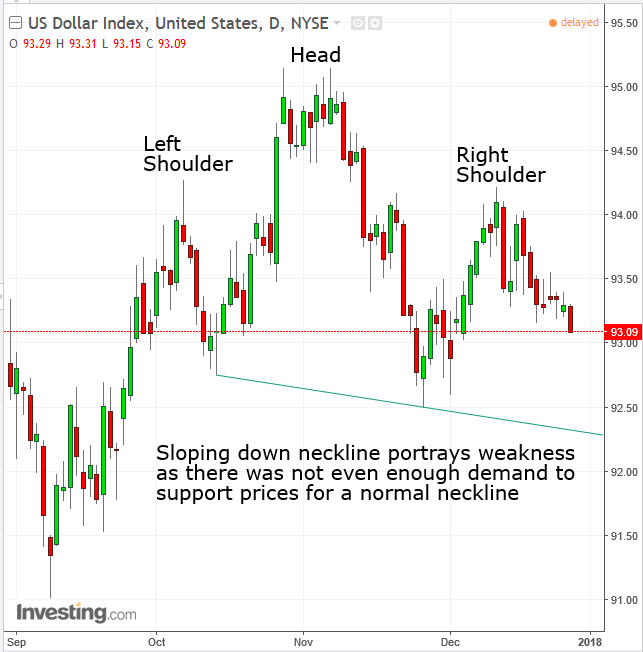
Yet another reason for today's Australian dollar gains may be US dollar weakness. The global reserve currency also fell against the euro and the pound.
One reason for the greenback's lower demand can be discerned via a seemingly unrelated event yesterday. The US Treasury sold $45 billion of 3-month bills but demand was at the lowest since January 2009, a show of investor anxiety before the US is expected to breach its debt ceiling in March. Confirmation of investor fears regarding US assets—currency and bonds: core bonds in Europe gained today, with Germany’s 10-year yield sinking 3 basis points, while the US 10-year note fell only 1 basis point.
Up Ahead
- Vietnam, which has ridden an export boom to tiger-economy status, is forecast to report a near-7 percent growth in GDP for the fourth quarter.
- US consumer confidence figures will be released later today.
- Italy’s parliament is expected to be dissolved tomorrow, ahead of elections in 2018.
Market Moves
Stocks
- The Stoxx Europe 600 Index gained 0.1 percent as of 8:17 London time (3:17 EST).
- The UK’s FTSE 100 advanced 0.2 percent to the highest on record.
- Germany’s DAX increased 0.4 percent.
- S&P 500 Futures increased 0.1 percent.
- Japan’s Topix Index rose 0.2 percent at the close in Tokyo. The Nikkei 225 Stock Average rose 0.1 percent.
- Hong Kong’s Hang Seng index was little changed, while South Korea’s KOSPI was up 0.3 percent.
- Australia’s S&P/ASX 200 closed little changed.
- China’s Shanghai Composite Index fell 1 percent.
Currencies
- The Dollar Index dipped 0.13 percent, the largest decrease in more than a week, potentially forming the right shoulder of a H&S top.
- The euro gained 0.1 percent to $1.1873, the biggest gain in a week.
- The British pound gained 0.1 percent to $1.3389, the strongest in almost two weeks on the largest climb in more than a week.
- The Japanese yen increased less than 0.05 percent to 113.18 per dollar.
Bonds
- The yield on 10-year Treasuries declined one basis point to 2.47 percent, hitting the lowest in more than a week with its fifth straight decline.
- Germany’s 10-year yield sank 3 basis point to 0.39 percent.
- Britain’s 10-year yield declined one basis point to 1.241 percent.
Commodities
- West Texas Intermediate crude fell 0.2 percent to $59.88 a barrel, the first retreat in more than a week.
- Gold increased 0.1 percent to $1,284.59 an ounce, hitting the highest in more than four weeks with its sixth consecutive advance.
- LME copper advanced 0.7 percent to $7,173.50 per metric ton, reaching the highest in more than three years on its ninth consecutive advance, the biggest gain in a week.
